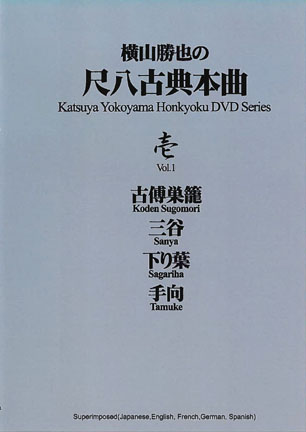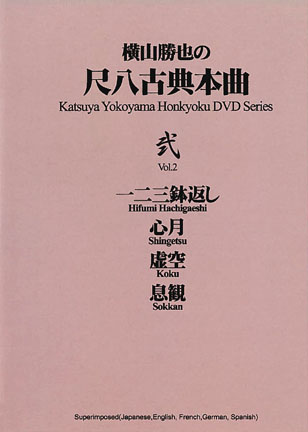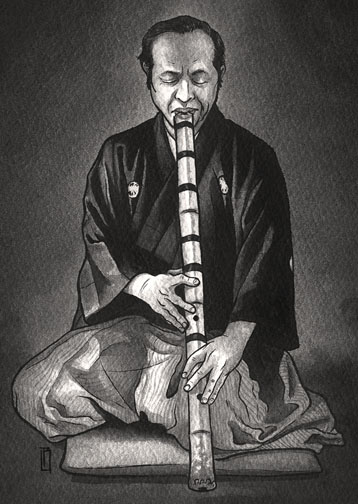 |
Katsuya Yokoyama SHAKUHACHI HONKYOKU Volumes 1 & 2 Japanese Language |
 |
 |
In these extraordinary teaching videos, Katsuya Yokoyama (1934-2010) founder of Kokusai Shakuhachi Kenshukan, performs in their entirety eight of the most important shakuhachi honkyoku pieces. The International Shakuhachi Training Center in Beisei, Japan was originally conceived and founded by Yokoyama Katsuya, one of the premier shakuhachi players, teachers and stylists of the 20th century. His driving vision was to establish a study group that would be truly international in scope, and to create a training center in Japan that would attract students from the world over to come and learn classical honkyoku as he taught it. These videos were recorded some years ago by Yokoyama-sensei as an aid to his students at the KSK. They are not merely performance videos, but an invaluable resource including Yokoyama playing the main honkyoku pieces on a classical size 1.8' shakuhachi, as well as discussing nuances and key elements of the music from his unique perspective. They serve as an excellent complement to Yokoyama's comprehensive 3-volume edition, SHAKUHACHI KOTEN HONKYOKU: Practice, Techniques & Notation Volume 1 Volume 2 Both Volumes 1 & 2 are Japanese Language with Superimposed Subtitles Recorded in NTSC quality video standard, these DVDs are Region Free, so playable on devices worldwide.
Volume 3 Volume 4 |
KATSUYA YOKOYAMA is one of the great shakuhachi masters of his generation. He was born in Shizuoka Prefecture in 1934 and studied Kinko-ryu and Azuma styles of music with his father, Rampo Yokoyama, and grandfather, Koson Yokoyama. At the age of 25, Yokoyama began to study with Fukuda Rando, founder of the Azuma School and with Watazumido-doso, a legendary Fuke master who sought to synthesize shakuhachi music and spirituality within the context of Zen Buddhism. Guided by these two eminent masters, Yokoyama was able to combine the modernism of Rando with the deeply religious traditional spirit of Watazumido in his training. With this foundation, he came to develop a remarkably powerful and creative style that embodied both ends of the continuum. A true descendant of the Kinko tradition transmitted down through the generations, he also pioneered a revolution in modern music that swept across post-War Japan. In 1960, Yokoyama completed his studies at the NHK Japanese Traditional Music Training Center and, one year later, formed Shakuhachi San-Jyuso-dan, a trio devoted to furthering new music for the instrument. In 1963, he founded the Nihon Ongaku Shudan (Japanese Music Group) and Shakuhachi Sanbon-kai (Group of Three Shakuhachi ) with Kinko master Aoki Reibo and Tozan master Hozan Yamamoto. This historic group helped to establish a new genre of music for shakuhachi trio. In 1967, Yokoyama was selected by the renowned composer Toru Takemitsu to perform the premiere of November Steps, his modern composition for shakuhachi, biwa and orchestra led by Seiji Ozawa and the New York Philharmonic. Since its opening over thirty five years ago, Yokoyama has performed this epic piece hundreds of times around the world.
Katsuya Yokoyama was head of the Chikushin-kai Shakuhachi Guild until his passing in 2010. He has been the recipient of many prestigious awards, amongst them the Geijutsu Sen-sho (Art Award) in 1971, the Geijutsu-sai Yushu-sho (Art Excellence Award) in 1972, the Geijutsu-sai Tai-sho (Art Festival Grand Prize) in 1973 given by the Agency for Cultural Affairs and the Ongaku no Tomo-sha Award in 1991. In 1988, Yokoyama founded the Kokusai Shakuhachi Kenshu Center (International Shakuhachi Training Center) located in Beisei-cho, Okayama, Japan where he hosted the first International Shakuhachi Festival in 1993. This event precipitated founding of the World Shakuhachi Society and Festival held in Boulder, Colorado in 1998. At this gathering, five of the world's greatest shakuhachi masters, including Yokoyama, performed in a single venue for the first time ever. In 2002, the Japanese government honored Katsuya Yokoyama for a lifetime of achievement by awarding him the esteemed Shiju Hosho (Purple Ribbon Medal) award
Learn more about |
